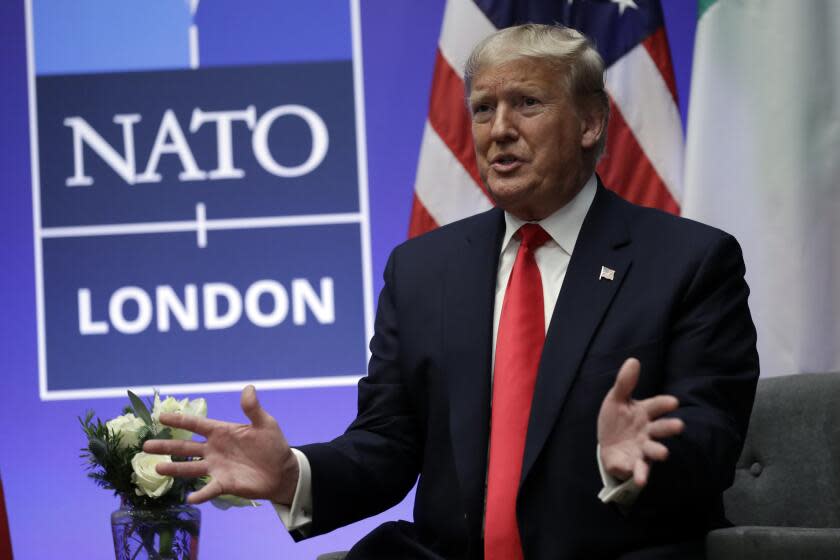Editorial: Trump's bombast on NATO invites Russian aggression

- Oops!Something went wrong.Please try again later.
Given that Donald Trump talks trash about a range of issues, it’s tempting to discount the rant in which he suggested that as president he would encourage Russia to attack NATO allies who were “delinquent” in their financial obligations.
That would be a mistake. Trump’s remarks are alarming even if he isn't seriously urging an act of war against a U.S. ally or suggesting that, if elected, he would pull the United States out of NATO. Instead of trying to explain away Trump’s outrageous comments, his allies in Congress should condemn them.
In remarks at a rally in Conway, S.C., over the weekend, Trump relayed an incident in which the president of a “big country” — presumably a NATO member state — supposedly asked Trump “if we don’t pay and we’re attacked by Russia, will you protect us?” Trump said he replied: “No, I would not protect you. In fact, I would encourage them to do whatever the hell they want.”
Read more: Editorial: Trump wants to be the U.S.' first dictator
Some prominent Republicans pooh-poohed his comments. Sen. Marco Rubio (R-Fla.) noted in a CNN interview that virtually every president has complained about other countries in NATO not doing enough. “Trump’s just the first one to express it in these terms,” Rubio said, “but I have zero concern, because he's been president before.” Sen. Lindsey Graham (R-S.C.) told Reuters that while he disagreed with the way Trump expressed himself, “Russia didn’t invade anybody when he was president and if he’s president again they won’t.”
It’s true that Trump isn’t the only president to call on NATO member states to spend more on defense. Such jawboning seems to have had a positive effect. Some NATO states are now satisfying the benchmark that they spend at least 2% of their gross domestic product on defense. NATO member states also have joined the U.S. in assisting Ukraine, which is not a member of the alliance, in its resistance to Russian aggression.
Read more: Editorial: Trump’s immunity arguments are laughable, unpersuasive — and dangerous to democracy
It’s important that all North Atlantic Treaty Organization members meet the 2% benchmark. But that shouldn’t be a condition for benefiting from the alliance’s commitment to mutual defense. That principle is reflected in Article 5 of the North Atlantic Treaty, which says that “an armed attack against one or more of them in Europe or North America shall be considered an attack against them all.” This commitment isn’t a one-way street. The U.S. benefited from Article 5 after the Sept. 11 terrorist attacks when NATO invoked that provision to support the military mission in Afghanistan.
It may be unlikely that Trump would try to take the U.S. out of NATO. For one thing, Congress last year approved legislation that would require an act of Congress or approval of two-thirds of the Senate before the president could withdraw the U.S. from the alliance. Yet that doesn’t make his comments any less destructive. If Russia believes Trump as president wasn’t committed to NATO and the principle of collective defense, it might be emboldened to move openly or through subversion against neighboring NATO countries.
Read more: Editorial: Trump should never return to the White House
It’s not surprising that Trump’s latest comments would create concern about his support for the alliance, which he once dismissed as “obsolete.” On Sunday NATO Secretary General Jens Stoltenberg warned: “Any suggestion that allies will not defend each other undermines all of our security, including that of the U.S., and puts American and European soldiers at increased risk.” A spokesman for the Biden White House said that Trump’s statement was “appalling and unhinged” — a political response that is also a statement of fact.
Arguments abound for why Trump is unfit to return to the White House, beginning with his attempts to overturn the 2020 election that culminated in the Jan. 6, 2021, attack on the U.S. Capitol. But voters also should reject his candidacy because of his hostility to NATO and the international order the alliance has helped to create.
This story originally appeared in Los Angeles Times.

